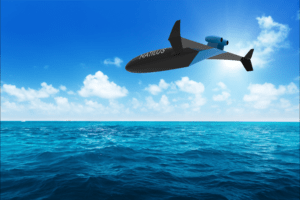
Bay-area based Natilus is developing a 30-foot long, fixed-wing drone set to test launch later this summer according to NBC News MACH – an unmanned aircraft that could potentially ship thousands of pounds of cargo across oceans. The report adds:
“If all goes as planned, the firm will develop an 80-foot drone that will begin flying routes from Los Angeles to Hawaii in 2019. A 140-foot drone with a 200,000-pound cargo capacity could be flying routes to China starting in 2020.”
The drone will not resemble the smaller quadcopters and hybrids favored by UPS and Amazon but will instead boast a carbon-fiber wingspan and fuselage as well as jet engines to make marathon trans-oceanic flights. Company officials say the drone will be able to cruise up to 20,000 feet and could shave about half the cost off a manned aircraft, transpacific flight.
Reporter David Freeman explains:
“Shipping 200,000 pounds of freight from Los Angles to Shanghai via drone, for example, would take about 30 hours at a cost of about $130,000, the company says. Delivery of the same cargo by a Boeing 747 takes about 11 hours and costs about $260,000.”
“Commercial pilot airplanes don’t want to fly slower because it would take forever to get there and pilot fatigue becomes an issue,” Natilus CEO Aleksey Matyushev told NBC. “For drones, that is not the case.”
Natilus’ lofty plans have drawn attention from the startup community – the company recently raised $750,000 from VC Tim Draper. Shipping companies are also taking notice. Chris Connell, president of global shipper CFI, told Fast Company in a recent report:
“Air cargo is all about speed at high price. Ocean freight is longer transit times at lower pricing. And with certain goods—be it perishables, or goods that are looking for that middle ground—that idea of middle price for middle transit times is that sweet spot.”
Although Natilus may not yet draw the fervent attention or financial firepower of an Amazon, the startup is set to revolutionize the way the world ships tons of goods across the ocean at a lower cost and more robust safety factor.
“Airplanes aren’t going to slow down,” Connell said. “And boats aren’t going to go faster. The drone concept adds something new. It adds to the intrigue.”
Jason is a longstanding contributor to DroneLife with an avid interest in all things tech. He focuses on anti-drone technologies and the public safety sector; police, fire, and search and rescue.
Beginning his career as a journalist in 1996, Jason has since written and edited thousands of engaging news articles, blog posts, press releases and online content.
Email Jason
TWITTER:@JasonPReagan
Subscribe to DroneLife here.